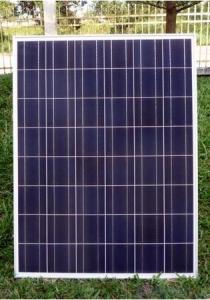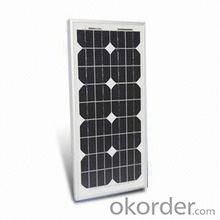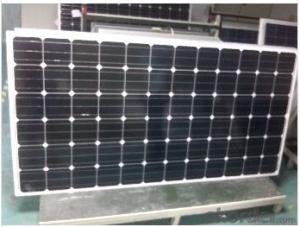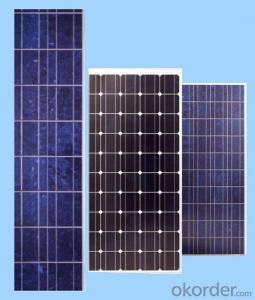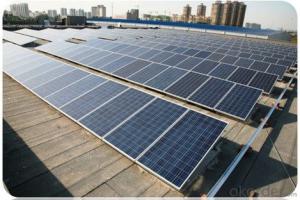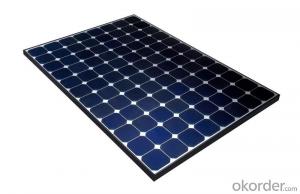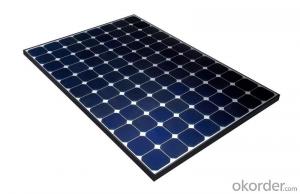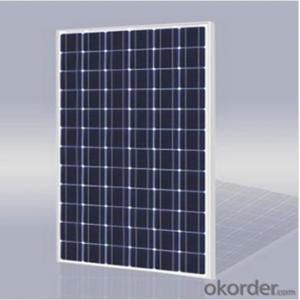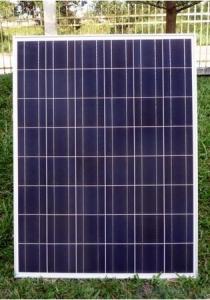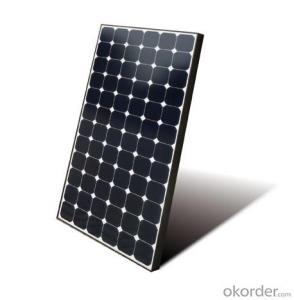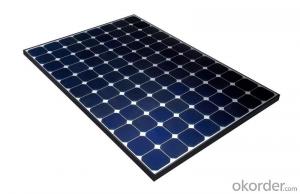Solar Panels Plano - CNBM Poly 245W Solar Panel with TUV UL CE Certificate for Residential
- Loading Port:
- Shanghai
- Payment Terms:
- TT OR LC
- Min Order Qty:
- 100 watt
- Supply Capability:
- 1000 watt/month
OKorder Service Pledge
OKorder Financial Service
You Might Also Like
Specification
CNBM Poly 245W Solar Panel with TUV UL CE Certificate For Residential
Introduction
Electrical connections are made in series to achieve a desired output voltage and/or in parallel to provide a desired current capability. The conducting wires that take the current off the modules may contain silver, copper or other non-magnetic conductive [transition metals]. The cells must be connected electrically to one another and to the rest of the system. Externally, popular terrestrial usage photovoltaic modules use MC3 (older) or MC4 connectors to facilitate easy weatherproof connections to the rest of the system.
Multiple solar cells in an integrated group, all oriented in one plane, constitute a solar photovoltaic panel or solar photovoltaic module. Photovoltaic modules often have a sheet of glass on the sun-facing side, allowing light to pass while protecting the semiconductor wafers. Solar cells are usually connected in series and parallel circuits or series in modules, creating an additive voltage. Connecting cells in parallel yields a higher current; however, problems such as shadow effects can shut down the weaker (less illuminated) parallel stringEach module is rated by its DC output power under standard test conditions, and typically ranges from 100 to 365 watts. The efficiency of a module determines the area of a module given the same rated output – an 8% efficient 230 watt module will have twice the area of a 16% efficient 230 watt module. There are a few solar panels available that are exceeding 19% efficiency. A single solar module can produce only a limited amount of power; most installations contain multiple modules. A photovoltaic system typically includes a panel or an array of solar modules, a solar inverter, and sometimes a battery and/or solar tracker and interconnection wiring.
Micro-inverted solar panels are wired in parallel which produces more output than normal panels which are wired in series with the output of the series determined by the lowest performing panel (this is known as the "Christmas light effect"). Micro-inverters work independently so each panel contributes its maximum possible output given the available sunlight.[6
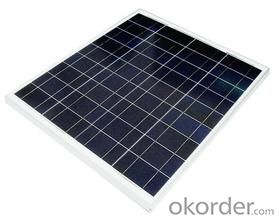
Suggested application
Home lighting business lighting,
Garden lighting, pavement lighting
Farmer household lighting
Decorative water pump
Traffic signal lighting
Industry area
Business area
Solar Power Plant
Product feature
Modules are made of Monocrystalline or Polycrystalline Silicon cell.
Materials and color of the solar panel frame: Clear anodized aluminum alloy type 6063T5 Universal frame; Silver-white color;
The output connection gathers the coupling: Selects conforms to the IEC-612615; 2005, class II, IEC61730 international standard; Airtight waterproofing binding clamp;
Module seal structure: The surface is thick, the high diaphanous rate armored glass with solar cell board special-purpose 3.2mm becomes after the high temperature lamination craft. The back selects has waterproof and anti- aged performance fine TPT materials. The entire block battery board has, the waterproofing, the anti- aging airtight and so on the fine performance;
Power tolerance: +/-3%
Packaging
International standard cartons (according to the requirements of customers)
- Q: I read on CNN's website last year some company was creating a very cheap type of solar panel, that needs minimal maintenance and and has minimal glare from the sun. And the creator of the project said he one day wanted to cover every rooftop in the US with these solar panels. Seems like a good idea to me but I havent heared anything of it for a long time and I don't know what they are called... any help?
- The most cost-effective solution, which the vast majority of new installs use today, is solar alongside the regular power company. That way, you need no batteries, and if the solar array isn't producing enough at any given time, you draw from the electric company. When the array is producing more than you need, instead of just throwing that power away, the power company buys it (usually). In short, yes, you will still have an electric bill, but a smaller one. On our house, the electric bill was a little less than $5 a month, with an end-of-year settlement of an additional $2. How much does it cost? Unfortunately, that's like asking how much personal transportation costs. Some people need a van to transport the kids to soccer, some may get by with a motorcycle, others may need only a bicycle. The best thing is to contact a professional installer to get a quote based on your location and electrical usage. Solar electric does not make financial sense in all areas. Our array cost $2,000 but don't use that as a guide. Yours might be 0 times that, or half that, depending on your area and needs.
- Q: Can solar panels increase the value of commercial properties?
- Yes, solar panels can increase the value of commercial properties. Installing solar panels not only reduces energy costs but also demonstrates a commitment to sustainability, which is increasingly appealing to businesses and consumers. Additionally, solar panels can generate income through government incentives like feed-in tariffs or by selling excess electricity back to the grid. These factors contribute to a higher property value, making it an attractive investment for potential buyers or tenants.
- Q: Is it possible for a 2V rated panel to charge a bank of batteries equal to around 36V? I believe that the panels should equal or exceed the voltage of the batteries but, I'm not for certain.
- With a 2 volt power source (solar panel, battery charger, vehicle charging system, etc...) you can charge three 2 volt batteries in parallel circuits then switch to a series circuit through a series/parallel switch to get 36 volts output. I've done this with my electric scooter so I can charge it with my pickup through the lighter socket when I'm away from home. It works great! When at home I just leave the switch in the 36 volt position, plug the charger in the wall receptacle and the charger puts out 36 volts. Actually 2 volt lead acid batteries have 2.6 volts when fully charged so the charging source has an output of 3.6 to 4.2 volts to effect a complete charge. In the series circuit the fully charged batteries would put out 37.8 volts so the charger would have an output of 40.8 to 42.6 volts.
- Q: about solar panel
- The answer depends upon the type of solar energy captured . Photovoltaic Solar Panels convert the energy into electricity. This electricity is ran throughout the building via wires. Thermal Solar Panels typically capture the energy in the form of heat. The hot water is circulated through the building in water pipes.
- Q: How do I clean my solar panels?
- To clean your solar panels, start by checking the manufacturer's instructions as some panels may have specific cleaning requirements. Generally, you can clean them by gently rinsing with water using a hose or a bucket and sponge. Avoid using abrasive materials or harsh chemicals that could damage the panels. If there's stubborn dirt or debris, you can use a mild soap solution with a soft brush to gently scrub the surface. Regularly cleaning your solar panels will help to maintain their efficiency and ensure optimal energy production.
- Q: Can solar panels be used to power a sports stadium?
- Yes, solar panels can be used to power a sports stadium. By installing a sufficient number of solar panels on the roof or in nearby areas, a sports stadium can generate renewable energy to meet its electricity needs. This can help reduce reliance on traditional energy sources, lower operating costs, and contribute to a more sustainable and environmentally friendly venue.
- Q: How do solar panels affect the overall sustainability of a building?
- Solar panels can significantly enhance the overall sustainability of a building by generating clean and renewable energy. By harnessing the power of the sun, solar panels reduce the reliance on fossil fuels, resulting in lower greenhouse gas emissions and a smaller carbon footprint. Besides producing electricity, they can also provide heating and cooling, further reducing energy consumption. Additionally, solar panels contribute to energy independence, improve energy efficiency, and can even generate excess power that can be stored or fed back into the grid. Overall, solar panels play a crucial role in promoting sustainable practices and mitigating climate change impacts.
- Q: OK, so if you put solar panels up on a roof, they are busy turning the sun's energy into electricity. So, does that mean the roof (and therefore the house/structure) stays cooler as well? Or does it still get hot, because . . . I dunno, maybe the panels don't convert all the energy, and the spillover still heats up the building.Any links or URLs to scientific answers would be appreciated, but I don't mind hearing from the Average Joe or (Joelle).
- The type depends upon what you want the solar panels to do. Generate electricity ? Heat gain? Makes a big difference. You should probably get a contractor who specialises in solar panels out to at least start your education on this subject or you could throw a lot of money away on something you don't really need or want.
- Q: i am very much interested in making a solar panel, my problem is where i can acquire the main components in order to build it, i am staying here in abu dhabi UAE i'm always searching on the internet for shops that can provide me a DIY kit but i did not find one, i need somebody who knows where i can get these things, please let me know.
- Build okorder
- Q: Can solar panels be installed on historical landmarks or monuments?
- Yes, solar panels can be installed on historical landmarks or monuments with careful planning and consideration to preserve the architectural integrity and cultural significance of the site.
Send your message to us
Solar Panels Plano - CNBM Poly 245W Solar Panel with TUV UL CE Certificate for Residential
- Loading Port:
- Shanghai
- Payment Terms:
- TT OR LC
- Min Order Qty:
- 100 watt
- Supply Capability:
- 1000 watt/month
OKorder Service Pledge
OKorder Financial Service
Similar products
Hot products
Hot Searches
Related keywords
